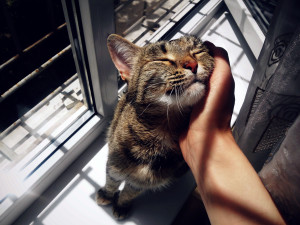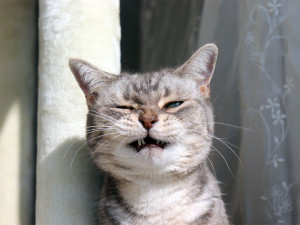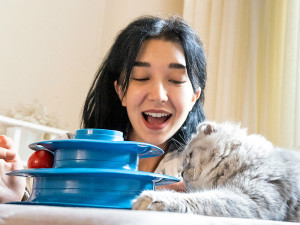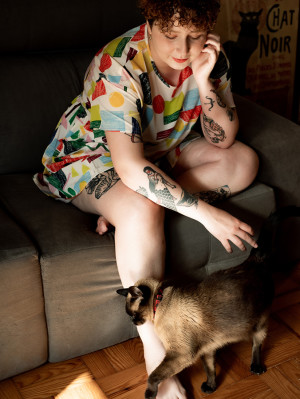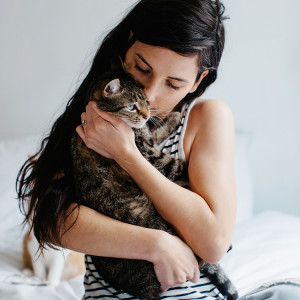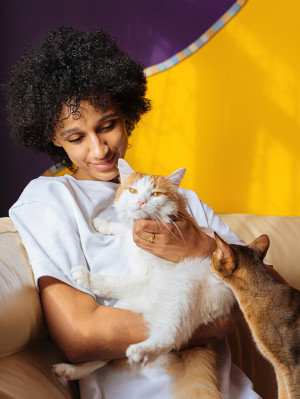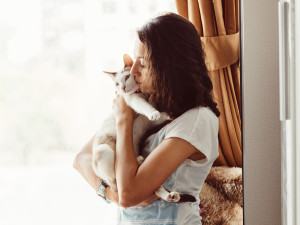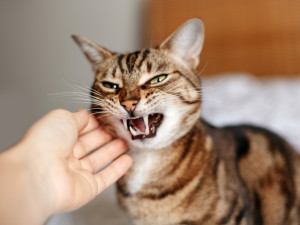How Does Your Cat Choose Which Lap to Sit On (and Why Isn’t it Yours)?
Hiding treats in your pockets out of sheer desperation? Learn how to make your thighs the Chosen Ones
Share Article
Compared to roommates, partners and dogs, cats are pretty low-maintenance. While their ‘I don’t need you’ independence is part of what makes us fall in love with them, their nonplussed attitude and lone wolf spirit can sometimes feel a little like rejection.
For instance, nothing hurts more than when your cat chooses someone else’s lap to curl up on instead of yours. Watching them saunter straight past your comfortable loins, the loins of the person who loves and feeds them, only to jump up and snuggle with Steve instead? Outrageous.
Obviously, you’re happy your kitty appears to be contented in Steve’s lap, but a little voice at the back of your head is almost certainly lamenting: why wasn’t it me?
And so, determined to get to the bottom of the lap-snub phenomenon, we’ve enlisted the help of certified cat behaviourist Lucy Hoileopens in new tab to help us figure out what can make one lap more appealing than another, and to find out if we can employ some cat tactics of our own to give our laps a chance.
Can my cat actually tell the difference between me and other people?
It’s easy to wonder if our cats actually know that the person on the sofa right now and the person whose bed they slept on last night are one and the same, but Lucyopens in new tab explains that they definitely do know who’s who in the household – which might not necessarily be comforting if your lap is ignored.
“Cats will absolutely recognise your scent,” says Lucy. “Cats use scent to identify members of their social group, and will rub their face and the side of their bodies on people to share a group scent.
“They leave this scent behind when they sleep on you too, so the more they enjoy sitting on your lap, the more they will want to do it again in future.”
But there’s always a chance that we’ve done something throughout our day (like washing our hands) that’s mixed a new fragrance with the ‘marker’ scent our cat left behind. You might even have unwittingly replaced it with an entirely new scent that actually puts your cat off you. If you want your cat to snuggle up to you, “you need to be careful of how you smell to them,” Lucy explains. “Using strong smelling hand soap or perfume might make them avoid your lap at all costs.”
A good reason not to purchase the Aesop soap. Along with the price tag.
How does my cat choose their favourite lap?
“This tends to be based on how they are treated by the people in the household,” says Lucy, further reinforcing the fact that your cat does know who you are (and does judge how you treat them). But, as we know with cats, it all comes down to their specific likes and dislikes. You can have the best intentions that will still fall flat depending on your cat’s particular taste or specific mood on a given evening.
“Well-meaning people trying to make friends can still miss the mark if they are too hands-on, or interact in a way the cat isn’t happy with,” says Lucy. “Those people that let the cat be in charge of their interactions – so only stroking when the cat approaches in a friendly way – will be a good candidate for a favourite family member. This is why a cat’s favourite person is often someone who doesn’t even like cats!”
So, does this mean that all our charming lap-patting and ‘come over here’ cooing is worthless?
Alas, it pretty much does. As Lucy explains, “cats like things to be on their terms, so if we pay them too much unwanted attention then it can lead them to avoid us. When people are nonchalant and ignore them, cats feel safer and more confident to approach.
“Unless you have a good relationship with that cat or know that they love the attention, they won’t respond well to excited hand gestures and loud noises. They tend to prefer quieter noises that get their attention like rubbing your fingers together or softly calling their name. It does depend on the cat though.”
How can I make my cat sit on my lap?
Trying to entice a cat over to you by spreading their favourite cushion, toy or blanket on your lap might work – but only momentarily. It’s the same thing with food; they might come over to investigate a snack, but if you’re not treating them on their own terms (which, for cats, seems to change moment-to-moment) then they’ll soon scarper off to find comfort elsewhere. “If a cat is just not a lap cat, this is unlikely to change with food,” says Lucy.
“Cats tend to have a good relationship with the people that feed them because they associate the person with the food and so are more likely to spend time around them.
“It’s still important to watch your behaviour when your cat is near. Giving them too much unwanted attention or making it uncomfortable to settle there will put them off.”
So to conclude, it’s a cat’s world and we’re just lucky enough to live in it. However, your cat may be more likely to come to snuggle into our lap if:
They’re already a lap cat.
We don’t flail about with overly enthusiastic hand gestures or noises.
They already have a good relationship with us.
We let them do whatever they want and only stroke or pet them on their own terms, ie: exactly how they want to be given affection and without too many inventive ideas of our own.
As we know, if we move our legs even a centimetre, it can often result in your seemingly super-comfy pal making a leap for another chair – so don’t be too offended if you’re not always picked for lap-sitting. If it turns out you are always The Chosen One for lap-snuggles, though, can you dine out on the fact that you’re the cat’s favourite person?
Always choosing your lap is a, “good sign”, confirms Lucy, “but sometimes they are just looking for somewhere comfortable.” Sigh. As always, it seems you can never get too accustomed to your cat’s affection, or too comfortable thinking that you can read your cat’s mind.
“However, it is a sign that they trust you and want to be close to you.”
Which, tbh, sounds good enough to us.
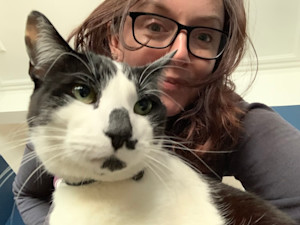
Kate Lucey
Kate Lucey is a writer and author who is always on the move. When she's in the UK she's joined on Zoom meetings by Rufus, who loves nothing more than walking across the keyboard and sending profanities to company town halls. Thanks to his cuteness, he remains a well-respected member of (most) teams.
Related articles
![a tattooed person with curly red hair on a couch pets a brown and black cat]()
Can Your Cat Smell If You’re Stressed?
And will they do anything about it if they do?
![dark-haired woman hugging cat that has imprinted on her]()
10 Signs Your Cat Has Imprinted On You
Feeling like you have a little shadow these days? A cat behaviourist explains why that’s happening
![A woman with curly black hair sitting in front of a dark purple and yellow backdrop while looking down affectionately at her two cats sitting on her lap]()
7 Ways to Build Your Cat’s Trust In You
If your cat still approaches you with a figurative arched eyebrow of scepticism, try these tricks to put them at ease
![Young woman hugging her cat]()
Why Do Cats Purr?
Surprise: it doesn’t always mean they’re happy
![Cat hissing at a person attempting to pet its cheek]()
Does Your Cat Hate Your New Partner?
How to help your kitty warm up to your SO

